




 |
   |
 |
Steven Wilson (UK) see: |
 |
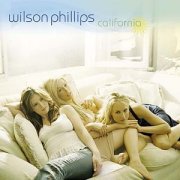 |
California (2004, 39.12) **½/½ |
|
| You're No Good Old Man California Already Gone Go Your Own Way Turn! Turn! Turn! Monday Monday Get Together |
Doctor My Eyes Dance Dance Dance In My Room Already Gone (acoustic version) |
|
Current availability:
Mellotron used:
On the remote offchance you haven't run into them, Wilson Phillips are a somewhat manufactured trio of children of the Summer Of Love™ generation, namely Carnie and Wendy Wilson (daughters of Brian) and Chynna Phillips, daughter of John and Michelle of the Mamas & the Papas and friends since childhood. Unsurprisingly, with genes like that, the three of them have amazing voices, which blend beautifully - a marketing man's dream. Unfortunately, their various parents' problems seem to've been revisited by their offspring, with Carnie's well-publicised major weight problem and the trio's split after their second album sold a mere million copies.
Reforming twelve years later, California is a concept album of sorts, with every track having some connection to the state, be it a lyrical reference, one of their parents' groups songs or one by another Californian artist, although I'm not sure where that leaves Neil Young's Old Man. OK, so he lived in Laurel Canyon for a while... To be honest, the album is heavily over-produced, with some hideous 'contemporary' touches; believe me, Turn! Turn! Turn! does not need a hip-hop-like sampled drum intro... Saying that, the overall feel of the album is pleasantly up (am I actually writing this?) and some of the arrangements work fairly well, although it's not what you'd call a classic. Oh well, at least it's a sensible 'vinyl' length, as they thankfully avoided the temptation to churn out seventy minutes of this stuff.
Roger Manning (of Jellyfish fame, amongst others) plays Mellotron, although the only obvious part is the strings and flutes on You're No Good, which, while nice, don't especially add anything much to either the track or the album. So; OK for what it is, but essentially a mainstream pop album consisting largely of inferior versions of some excellent songs and minimal Mellotron.
See: Beach Boys
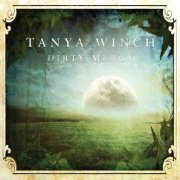 |
Dirty Mercy (2011, 55.46) **½/T |
|
| No Fairy Tale Opa Lights Easy Full Moon Roll You Home Straight Through Lay Me Down Wicked Problem |
Charcoal Heart Apologies Pull You in Getting Ready Carry on |
|
Current availability:
Mellotron used:
Austin, TX native Tanya Winch's Dirty Mercy (also the name of her band) is, as you'd expect, an Americana album, at the more lightweight end of the genre, sadly. Better tracks? Maybe Full Moon, the funky Wicked Problem and semi-epic closer Carry On.
Ron Flynt on Mellotron, with authentically clicky flutes on opener No Fairy Tale, although I'm less convinced by the background strings on Lay Me Down. Really not that exciting, then, although at least it sounds like real Mellotron.
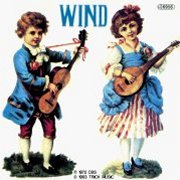 |
Morning (1971, 39.16/42.56) ***/TTTTThe Morning SongThe Princess and the Minstrel Dragon's Maid Carnival Schlittenfahrt Puppet Master Tommy's Song [CD adds: Josephine] |
Current availability:
Mellotron used:
On the evidence of Morning, the unfortunately-named Wind played a kind of folk/prog hybrid, with an unsurprisingly Germanic feel to the proceedings. In places (notably on The Princess And The Minstrel) it crosses the boundary between whimsical and outright ludicrous, but if you can ignore the vocals, much of the album works, at least as a period piece, although their rockier material was definitely a mistake.
However good or otherwise the music may be, there's Mellotron (from Lucky Schmidt, apparently) to be heard all over the album. The Morning Song features strings, with a brass melody line, then a chordal flute part and the strings on Dragon's Maid are about as full-on as they get. Actually, the album's first five tracks are all right up there on the Mellotron front, so, thumbs up for Mellotron fans, even if the music sometimes leaves a little to be desired.
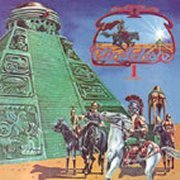 |
1: Symphinity (1977, 45.51) ***/T½Forward We RideHorsemen to Symphinity Glad to Be Alive Gypsy No Scruples Lamb's Fry Non Siamo Perfetti Flight Call |
Current availability:
Mellotron used:
Australian über-progsters Sebastian Hardie fell apart after their second release, Windchase and guitarist/vocalist Mario Millo and keys man Toivo Pilt formed a new outfit named after said album. Unsurprisingly, I suppose, it sounds very little like Sebastian Hardie, having more of a Downunder Santana vibe about it, both in the guitar department and with the jazzy chord progressions. The lyrics are the usual quasi-mystical stuff that was disappearing around this time; in fact, much as I bemoan the passing of the first wave of progressive rock, Windchase are indicative of why it happened. Unlike the Seb Hardie albums, 1: Symphinity is somewhat meandering, with far too many guitar solos and far too little melody (certainly in comparison to Four Moments), apart from the odd bits of near-MOR slop like Glad To Be Alive and Flight Call, which probably suffer from a surfeit of melody, if such a thing is possible.
On Seb Hardie's Windchase (confusing, isn't it?), Pilt only really used his Mellotron for choirs, being of the opinion that strings sounded better coming from a Solina (no they don't) and the same approach seems to've been used here. After a tip-off, I actually suspect that his machine contained the notorious 'Teddy Taylor (or 'TT') Choir', one of the less wonderful efforts in the sound library, being no less than a 16-voice choir. Sadly, this doesn't sound twice as good as the usual 8-voice, just murkier. Anyway, assuming that's what it is, you can hear it in the closing seconds of Glad To Be Alive, on Gypsy and very obviously, with key-click, on No Scruples. Finally, it actually sounds like Mellotron strings, for one last time, on Flight Call, but I wouldn't actually stake my reputation on it. So; while the album has its moments (Non Siamo Perfetti is a beautiful, if short, classical guitar piece), it's a real letdown after the glories (pun intended) of the two Seb Hardie albums and the Mellotron use is decidedly average, too. Approach with caution.
Incidentally, Millo produced a (very) slightly progressive solo album two years later, Epic III (**½), with a passable prog effort in the 14-minute title track, but despite a 'thanks' to Toivo Pilt for 'instruments and equipment', there's no Mellotron to be heard. I believe Millo subsequently moved into film and TV music, like several other Aussie proggers of the time, making this his last gasp on the prog front.
See: Sebastian Hardie
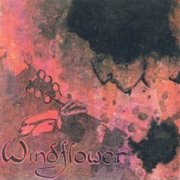 |
Windflower (1974, 40.58) ***/T½Headed for the CountryYou Know it Ain't Often Children of the Loom Remover of Difficulties Marriage of Two Minds God is Passing By Wind Dance Back to the Calling of Home Song Celestial |
Current availability:
Mellotron used:
Windflower were an Alaskan folk outfit, with strong links to the unitarian Bahá'í faith (listen to the lyrics of God Is Passing By and Wind Dance), which at least makes a change from the tedious conformity of evangelical Christianity, I suppose. What I believe is their sole album, Windflower, really isn't that exciting, to be honest; as one blogspot puts it, "This is somewhere between genuine acid folk and cringeworthy up-with-people commune folk" (to which I would add, "With a smidgeon of jazz"), which probably describes it better than I ever could. A couple of tracks at a time is fine, but the whole forty minutes in one go is a bit like eating three desserts on the trot; sickly-sweet, leaving one with a queasy feeling afterwards. If I had to pick one track that stands out from the pack, closer Song Celestial seems to sum up the band's style in under five minutes and has a little more life to it than the rest of the album.
Vocalist/guitarist Gavin Reed contacted me recently to tell me that Victor Wong played the album's Mellotron parts; apparently, it was recorded at a studio in Munich that had one, so the band rearranged some of the songs to work it in. Now that's the kind of dedication I applaud... Not that he played it that much, mind; background strings on Headed For The Country, You Know It Ain't Often and Song Celestial, although I'm sure it would've worked nicely on most of the tracks. I don't hear any Mellotron flute, but then, guitarist David Rychetnik played a real one, so they presumably didn't feel the need. For what it's worth, although I don't usually list whole lineups, this one's obscure enough that it's worth me mentioning that the band were a seven-piece, including, apart from the three members listed above, Gary Lamar (vocals/guitar) and Marshall Murphy, Kitty Wong and Zonettah Varley on vocals and percussion.
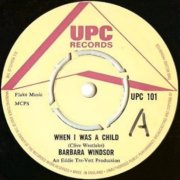 |
7" (1970) *½/T½ When I Was a Child What a Right Carry on |
Current availability:
Mellotron used:
British? Of a 'certain age'? Then you'll be well aware of Barbara Windsor, not to mention almost certainly having seen her in multiple Carry on films (although it turns out she only actually appeared in nine. It just seems like dozens) and/or Eastenders. Carry on? You don't know? Don't ask. Really. Our Babs is from the era of light entertainment when you were expected to be able to do a bit of everything (remember Fred Astaire's screen test report? "Can't sing. Can't act. Can dance a little"), so we shouldn't be too surprised that she released a single in 1970, the revoltingly twee When I Was A Child, every bit as sickly as you'd expect. Before you ask, the flip, What A Right Carry On, is only marginally more palatable due to Babs' reverting to her nasal cockney whine; irritating, but at least authentic.
An unknown session musician adds (presumably) MkII Mellotron strings to the 'A', no doubt for budgetary reasons, to no great effect (kind-of thanks for this, Chris). Is this one of the least-worthy releases on this entire site? I think it might be. Avoid.
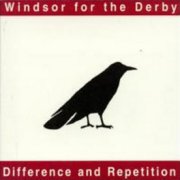 |
Difference & Repetition (1999, 35.50) ***/T*Shoes McCoat ** Shaker The Egg Nico Lost in Cycles |
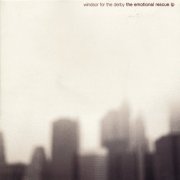 |
The Emotional Rescue LP (2002, 43.59) **½/TThe SameNow I Know the Sea Emotional Rescue Fall of '68 Indonesian Guitars Mythologies Awkwardness Another Rescue Donkey Ride |
Current availability:
Mellotrons used:
Windsor for the Derby fall into that awkward 'post-rock' category that seems to encompass anything and everything from the last couple of decades that doesn't want (or possibly know how) to rock, making a virtue of it in the process. Think: Tortoise, Godspeed You! Black Emperor. The trouble is, it seems to me that most of its practitioners have little idea what they're doing, so end up making the sort of supposedly heartfelt and 'emotional' tedium dribbled out by Mogwai and their ilk. I'm sure the point is that you're supposed to give this music loads of time, listening to it in a dark room with as little background noise as possible and giving it a chance to sink in. Unfortunately, back in the real world... You could say the same for a lot of prog, but at least most of it has some sort of handle to grasp in the first place and doesn't just metaphorically slip through your fingers.
1999's Difference & Repetition is the band's third full-length LP, working well enough on its own level, I suppose. They certainly do the 'repetition' bit of the title on the twelve-minute Shoes McCoat, a two-guitar cycle that can be seen as either compelling or monotonous (or both?), depending on the listener's perspective and, while the rest of the tracks are shorter, the style essentially remains the same. Mellotron (real?) from an unknown source on the irritatingly-named **, with a decent enough flute part, but nothing that striking, to be honest.
They followed up, three years later, with the rather cheekily-named The Emotional Rescue LP. Is it possible these chaps haven't heard of The Stones' album? Unlikely, but you never know... Unfortunately, the intervening time seems to have blunted their edge, leaving a hollow shell of a record that seems to drag on forever, although it's actually within 'vinyl length'. The nearest it comes to a 'best track' is Emotional Rescue itself, where they pick up the pace a little, but all in all, it's a pretty dreary affair. One Mellotron track (real? Who knows?), probably from Anna Neighbors, in Awkwardness, which adds a passable string part to a dull song, doing little to add any real excitement. Sorry to be so hard on this album, but when you listen to the amount of music I do, the mediocre is not going to get a second chance, even if that means I miss out on the occasional 'grower'.
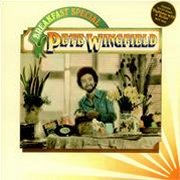 |
Breakfast Special (1975, 39.55) ***/T½ |
|
| Eighteen With a Bullet A Whole Pot of Jelly (for a Little Slice of Toast) Hold Me Closer Shadow of a Doubt Anytime Please Lovin' as You Wanna Be Kangaroo Dip |
Number One Priority Shining Eyes |
|
Current availability:
Mellotron used:
Pete Wingfield's had a long and honourable career, mostly (I believe) in production and session work, but, in 1975, Island gave him enough money to knock out a solo album. Sadly, it's a rather ordinary piece of work; not actually bad, but just a bit unexciting and horribly of its time. Mid-'70s mainstream soft rock doen't sound that dynamic these days; in fact, I can remember doo-wop pastiche Eighteen With A Bullet being a hit at the time and it didn't sound that exciting then... Wingfield's falsetto grates a little, too, so it's nice when he lowers his range a little, as on Shining Eyes.
I don't feel inclined to slag Breakfast Special off, though; Wingfield's got bags of talent - it's just a little misdirected in this case. There's Mellotron to be heard on a couple of tracks, the aforementioned music biz send-up Eighteen With A Bullet and Hold Me Closer; pseudo-orchestral strings on both, but quite nice use, if (you guessed it), rather unexciting. I couldn't in all honesty recommend this album very highly, but at least it's better than some of the things I've listened to lately...
See: Jellybread
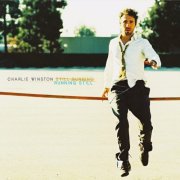 |
Running Still (2011, 46.20) **/½ |
|
| Hello Alone Speak to Me Where Can I Buy Happiness? The Great Conversation She Went Quietly Unlike Me Until You're Satisfied Wild Ones |
Making Yourself So Lonely Rockin' in the Suburbs Summertime Here All Year Lift Me Gently |
|
Current availability:
Chamberlin used:
Charlie Winston Gleave's third album, 2011's Running Still, combines elements of acoustic singer-songwriterdom and mainstream indie, unwelcome hints of generic 'dance' productions creeping into the mix in places, not to mention Winston's irritating habit of using hip-hop tropes on occasion. Better tracks? The Great Conversation is semi-based on Beethoven's Moonlight Sonata and, er, that's it. At its worst, it's the kind of stuff US TV producers like to stick on their crummy shows, notably She Went Quietly, used on Grey's Anatomy.
Patrick Warren's credited with simply 'keyboards', but it sounds like Chamberlin strings on Where Can I Buy Happiness? to my ears. Seriously you don't want to hear this, anyway. I mean, I'm never going to play it again.
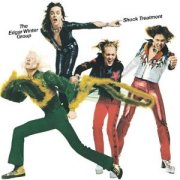 |
Shock Treatment (1974, 40.33) ***½/TT |
|
| Some Kinda Animal Easy Street Sundown Miracle of Love Do Like Me Rock & Roll Woman Someone Take My Heart Away Queen of My Dreams |
Maybe Some Day You'll Call My Name River's Risin' Animal |
|
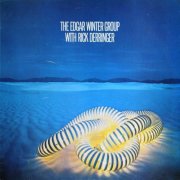 |
Edgar Winter Group With Rick Derringer (1975, 43.03) **½/T |
|
| Cool Dance People Music Good Shot Nothin' Good Comes Easy Infinite Peace in Rhythm Paradise/Sides Diamond Eyes Modern Love |
Let's Do it Together Again Can't Tell One From the Other J.A.P. (Just Another Punk) Chainsaw |
|
Current availability:
Mellotron/Chamberlin? used:
Edgar Winter (brother of Johnny, of course) should need no introduction: incredibly successful in the '70s, his career has veered between r'n'b, blues, rock and jazz, although his popularity waned towards the end of the decade. 1974's Shock Treatment (credited to the Edgar Winter Group) was his follow-up to '72's They Only Come Out at Night, which gave him his biggest hit by some way, the instrumental Frankenstein. Shock Treatment's a good album, if rather of its time and despite Winter retaining Rick Derringer, the band's other guitarist, Ronnie Montrose, was sorely missed. Best tracks include opener Some Kinda Animal (and its corollary, closer Animal), Do Like Me and Queen Of My Dreams, but it's a pretty satisfying listen throughout, albeit one lacking anything of the quality of its predecessor's hit. Winter plays all keys himself, including several tracks'-worth of great Clavinet work and the skronky ARP 2600 on Animal, plus, of course, Mellotron, with flutes and strings on Sundown, flutes, strings and choir on Someone Take My Heart Away and strings on the more upbeat River's Risin'.
Edgar Winter Group With Rick Derringer was one of two albums Winter released that year, along with solo effort Jasmine Nightdreams. Now, I'm taking a bit of a punt on this one, as I'm not convinced we're actually hearing any tape-replay, so bear with me. The album itself is a slick, mainstream effort, freely mixing pop, rock, funk and soul tropes into a rather unappetising stew, of the kind soon to go out of favour, easily at its best on the rock'n'roll of J.A.P. (Just Another Punk) and instrumental closer Chainsaw, clearly an attempt to capture that Frankenstein lightning in a bottle for a second time. Someone (presumably Winter) plays what dun'arf sound like a Chamberlin (thanks for this, Chris), with brief bursts of flute and cello on Paradise/Sides and flutes on Diamond Eyes. And are those distant, reverbed strings on Good Shot? Probably not.
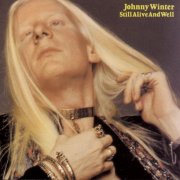 |
Still Alive and Well (1973, 44.56) ****/T |
|
| Rock Me Baby Can't You Feel it Cheap Tequila All Tore Down Rock & Roll Silver Train Ain't Nothing to Me Still Alive and Well |
Too Much Seconal Let it Bleed Lucille From a Buick Six |
|
Current availability:
Mellotron used:
One of the all-time great (very) white bluesmen, Texan Johnny Winter (1944-2014) tragically blunted his formidable talent with on-off hard drug use, reduced in his later years to playing sitting down, his heavily-tattooed, skeletal frame making his '70s incarnation look a picture of ruddy health. 1973's ironically-titled Still Alive and Well was his fifth studio album, in the days when you could still add the suffix '-rock' to his blues and rock it does, with incendiary takes on standards (Rock Me Baby, Lucille) and his own or guitarist Rick Derringer's material (Silver Train, the title track). Winter knows how to slow it down, too, with the balladic Cheap Tequila, the country-inflected Ain't Nothing To Me and the acoustic blues of Too Much Seconal, complete with extra added flute, breaking the flow in not unpleasant fashion, making for an all-round satisfyingly (mostly) heavy blues album.
Mellotron on one track from Todd Rundgren, with a strangely-panned string part on Cheap Tequila, although that seems to be it, not just for the Mellotron, but on the keyboard front altogether. So; great blues album, rather lesser Mellotron one. I'm not sure why it's taken me this long to 'discover' Johnny Winter, but I imagine I'll be tracking down a few more of his 'classic' albums in the near future.
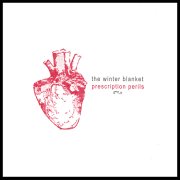 |
Prescription Perils (2004, 34.54) **½/½ |
|
| Four Tornados Last Resort Why I Act This Way Sticks and Stones Darkness Failed You Darkness on the Edge of Town On My Own Twenty-Five Now |
Town of Talk Wedding Vow |
|
Current availability:
Chamberlin used:
It seems Illinois/Iowa natives The Winter Blanket formed from the ashes of Darling (as against Darling, of course), their last (?) album, 2004's Prescription Perils, almost defining the term 'indie folk'. Although it occasionally ups the volume levels slightly, it's at its best on their acoustic take on Springsteen's Darkness On The Edge Of Town and On My Own.
Tom Herbers plays Chamberlin something on Darkness Failed You. Something? Possibly flutes, possibly strings, a high line doubled with real voice, making it hard to tell what it is, other than that it's tape-replay derived. Not honestly worth the effort, anyway.
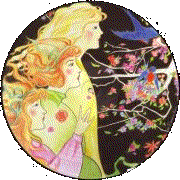 |
The Chapin Sisters/Winter Flowers (2007, 34.20) ****/T½Let Me Go (Chapin Sisters)Slow Devotion (Chapin Sisters) Why Have You Left the One You Left Me for (Chapin Sisters) Sea Shanty (Chapin Sisters) Pebble or Mountain (Winter Flowers) Mariah (Winter Flowers) Fire Song (Winter Flowers) Earth and Sky (Winter Flowers) |
Current availability:
Mellotron used:
The Chapin Sisters and Winter Flowers are current American psychedelic folksters, although the former are more 'trad' than the latter. 2007's (vinyl-only?) The Chapin Sisters/Winter Flowers is a split LP, one side each, the sisters contributing four delicate, massed-harmony pieces, while Winter Flowers layer their male/female vocals over another four excellent folk/psych/rock songs, highlights including Fire Song's duelling flute and recorder and possibly the album's best track, closer Earth And Sky, complete with Christof Certik's crumhorn.
Winter Flowers' Sasha Smith plays Mellotron on side two, with a lovely, subtle chordal string part on Mariah and flutes and choirs on Earth And Sky; since the sleeve credits say 'thanks to Rob Campanella' (The Quarter After/Lovetones), I think we can probably assume it's his M400 we're hearing here. Why is this not available on CD? It's all very well being 'purist', but a record this good deserves a wider audience and vinyl-freak labels tend to forget that most people no longer own a turntable. Anyway, if you get the chance, a damn' good album and some nice Mellotron work.
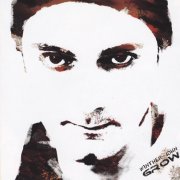 |
Grow (2003, 49.55) ***/TTT |
|
| Distracted Let's Get Tattoos High on You Like You Gravity In Our Own Time Can't Change the World Grow |
Still Delayed Replay June High Five Northern Star |
|
Current availability:
Mellotron used:
Marcus Winther-John, ex-Inside the Whale, released his first solo album, Grow, in 2003, a breezy pop/rock effort, at its best on Let's Get Tattoos, Like You, Still and Delayed Replay, with its deceptively gentle "Fuck you" refrain.
Tim Christensen plays one (or more) of his M400s, with strings on High On You, Gravity, Still (mixed with real ones), June and closer Northern Star and flutes on Like You. All in all, a surprisingly decent effort, just about erring on the right side of mawkishness.
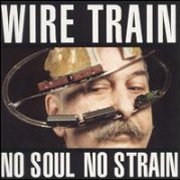 |
No Soul No Strain (1992, 48.01) ***/TT½ |
|
| Stone Me Open Sky Yeah, Yeah, Yeah Crashing Back to You Hey Jordan Other Lover How Many More Times Willing it to Be |
Higher Impossible When I Met You 17 Spooks |
|
Current availability:
Mellotron used:
Wire Train, from San Francisco, started life in the '80s as a sort-of arena rock-type band, supporting the likes of U2 and the Alarm, but by the early '90s had become a rather bland pop/indie outfit. No Soul No Strain (apparently a pun on the sleeve art; 'nose hole/nose train') has its moments, but is generally unexciting, although Jeff Trott's guitar work occasionally raises a little sweat.
There's no keyboard player credited, but there's Mellotron to be heard on a handful of tracks, along with some generic synth. The strings (with a dash of flutes) on Crashing Back To You are really full-on, with some wobbly pitchbend towards the end, just to prove they're real; it's a pleasure to hear one played and know it's real, in these days of lazy sample-playback. More of the same on Higher and 17 Spooks, making for a passable Mellotron album, even if the music's rather lacking.
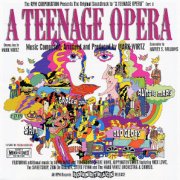 |
A Teenage Opera (1996, recorded 1967, 70.32) ***½/½ |
||
| Theme From a Teenage Opera Festival of Kings Grocer Jack (Excerpt From a Teenage Opera) The Paranoic Woodcutter Mr Rainbow Glory's Theme (All Aboard!) On a Saturday Possums' Dance |
Auntie Mary's Dress Shop Love & Occasional Rain Grocer Jack (Reprise) Sam Farewell to a Broken Doll (He's Our Dear Old) Weatherman Shy Boy Grocer Jack's Dream |
Barefoot & Tiptoe Knickerbocker Glory Dream Dream Dream Colonel Brown Cellophane Mary Jane Paranoic Woodcutter #2 Theme From a Teenage Opera (end titles) |
|
Current availability:
Mellotron used:
The story of A Teenage Opera is long and complex; several other websites detail it far better than I ever could, but the gist goes something like this: Wirtz was one of EMI's wunderkind mid-'60s producers, whose reputation soared after the success of Keith West's Grocer Jack (Excerpt From A Teenage Opera), a magical toytown-psych hit, sung by Tomorrow's vocalist (Tomorrow's chief legacies, of course, are as Steve Howe's first major band and as writers of the classic My White Bicycle). The single's subtitle alluded towards a larger concept, but Wirtz' 'everything including the kitchen sink' production technique panicked penny-pinching label execs, who pulled the plug after only a few tracks had been completed.
Fast-forward to 1996: those estimable RPM people resurrected the concept with Wirtz' help, pulling together every surviving recording, several released as singles at the time under various names. The 'completed' concept is something of a toytown-psych classic, although those with delicate constitutions should possibly steer clear of its more twee aspects. Grocer Jack is one of its standout tracks, unsurprisingly, as are Sam (another single) and (He's Our Dear Old) Weatherman, originally released under Wirtz' own name in 1968. Most of the concept used (expensive) string sections, but Abbey Road's notorious MkII Mellotron (as used by The Beatles and many others) was hauled out for one track, with probable flute stabs on On A Saturday, although the accordion on (He's Our Dear Old) Weatherman is real, as against the Mellotron I'd assumed.
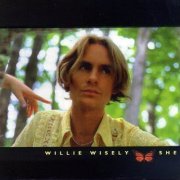 |
She (1996, 38.48) ***/½ |
|
| Go Ready to Wear Love is Wrong Vagabond Bleus (All the Rage) Sleeping With Girls Make Love His Eye, it's Wandering |
Loander My Guitar Loander My Sitar Please Don't Talk About Me (When I'm Gone) Working Girl Go Faster! Lady of Love |
|
 |
Wisely (2007, 44.15) ***½/T½ |
|
| On My Way Cracked World View Tokyo Arbor Unfamiliar California It's Gonna Be Beautiful Nothing But Wind Ella |
Vanilla Only losing Me Through Any Window I'll Be Singing |
|
Current availability:
Chamberlin/Mellotron used:
Willie Wisely (possibly even, although improbably, his real name) has been around for twenty-odd years now, peddling his highly individual brand of powerpop, slowly gaining a name for himself. 1996's She (presumably name in honour of the Rider Haggard novel) is his third album, a decent enough release with one major problem (as has been pointed out in other online reviews): its diversity. Variety is the spice of life, but this almost sounds like a various artists compilation, veering between the rock'n'roll of Ready To Wear, the soul-ish brass-driven Love Is Wrong and several tracks that sound slightly too close to ELO for comfort. Best track? Probably the witty Loander My Guitar, followed by Loander My Sitar. Although John "Strawberry" Fields is credited with Chamberlin on Vagabond, it's actually to be heard on the closing seconds of the previous track, Love Is Wrong, with a few seconds of that weird solo male voice that sounds so unlike anything produced by a Mellotron.
2007's Wisely (released as simply Wisely) is either a confirmation of Willie Wisely's increased focus or a symptom of a narrowing worldview; Planet Mellotron prefers the former. It's certainly far more consistent than earlier releases, top tracks including California, Nothing But Wind, Only Losing Me and the lovely Through Any Window, the overall impression being of an album complete in itself, with no obvious dead wood. Rick Boston and Kalle Gustafsson Jerneholm play Mellotron, with a string line on Cracked World View and flutes on California, although I suspect the brief string part on Vanilla is something else entirely.
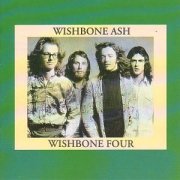 |
Wishbone Four (1973, 43.09) **½/TSo Many Things to SayBallad of the Beacon No Easy Road Everybody Needs a Friend Doctor Sorrel Sing Out the Song Rock'n'Roll Widow |
Current availability:
Mellotron used:
Wishbone Ash's fourth album had them sticking pretty closely to the template they'd laid down a couple of years earlier, although without the strength of songwriting they'd displayed on Argus. The album opens with an uncharacteristically rocking number, So Many Things To Say, with a more insipid take on the style on No Easy Road. Most of the rest of Wishbone Four sits firmly in soft-rock territory; you can't even excuse it by saying it has prog tendencies, with Sorrel moving beyond straight balladry into the country area.
Mellotron strings on Everybody Needs A Friend from George Nash, to no great effect, I'm afraid. I don't like to be so down on 'The Ash', but this album is actually quite soporific in places and even the 'rock' er, doesn't. Argus may not be the heaviest album ever, but at least the songs stand up over 30 years later. The same cannot be said for the bulk of Wishbone Four.
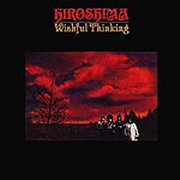 |
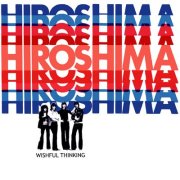 |
Hiroshima (1971, 34.19) **½/T½ |
|
| Hiroshima This Time Tomorrow She Belongs to the Night Mary Goodbye Ever Since I Can Remember We're Gonna Change All This Now United States of Europe '79 |
I Wrote a Song 1984 Goodbye Lover |
||
Current availability:
Mellotron used:
Wishful Thinking seem to've picked up a reputation for being slightly psychedelic, or even progressive, although going by their best-known album, 1971's Hiroshima, they were dyed-in-the-wool soft rock outfit. The title (and best) track (much-covered since) was a massive hit in Germany, leading the band to decamp there for a while, but it doesn't look like they made another album in their lifetime. The album isn't awful, but most of it glides gently by, leaving little impression on the synapses, making it unsurprising that the original release isn't currently available.
An uncredited keyboard player adds Mellotron strings to Hiroshima itself and flutes to 1984, although only the title track utilises it to any great effect. There's a compilation available called Wishful Thinking that includes both of Hiroshima's Mellotron tracks, which might be worth picking up if you see it cheap enough, but if I were you, I wouldn't go too far out of your way for this rather unexciting band.
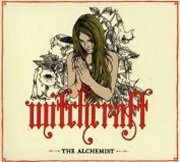 |
The Alchemist (2007, 43.14) ****/TWalk Between the LinesIf Crimson Was Your Colour Leva Hey Doctor Samaritan Burden Remembered The Alchemist Part 1 Part 2 Part 3 |
Current availability:
Mellotron used:
Witchcraft are current purveyors of early '70s-sounding hard rock and make no mistake, this is defiantly hard rock, not heavy metal; the guitars are 'overdriven', not 'distorted'. The Alchemist is their third album, sounding like a long-lost classic from 1972, only with better production and a (welcome) lack of period detail, such as the diversions into non-complimentary styles favoured by various bands of the era, presumably in the name of 'variety'. The riffs actually sound like riffs, not basic chord sequences with some fiddly-diddly two-note nonsense over the top (see: just about any current band that Classic Rock mag go wild about) and the material overall is fresh-sounding, given that it's heavily reliant on a 35 year-old style for inspiration. Best track? Maybe
Mellotron from noted Finnish Mellotron owner/player Tom Hakava, with massed cellos on Samaritan Burden and a brief string part on (I think) part 2 of the quarter-hour closing title track. All in all, a pretty cool album, I have to say, on what has to be the best label for hard rock these days, Rise Above and not just because I used to be (sort of) signed to them in Litmus. Next to no Mellotron, sadly, compared to how they could have used it, but then, live reproduction might have been difficult. Listen, if you have any vestigial interest in that '70s hard rock thang, buy this album and help both the band and the label. Very much worth the effort.